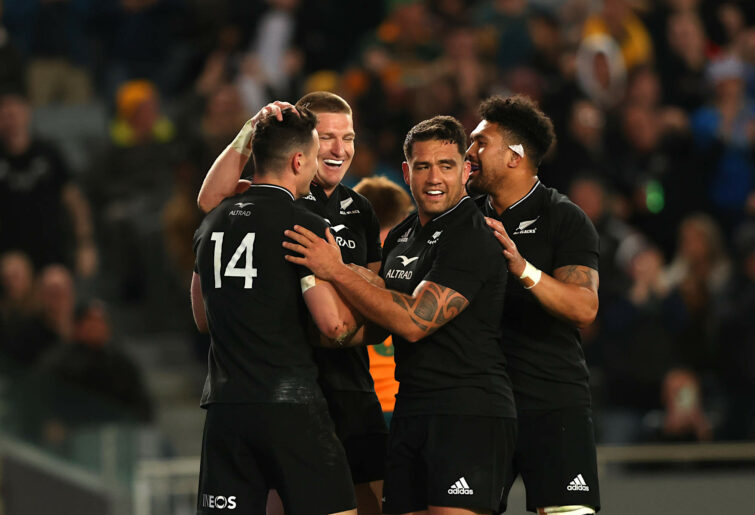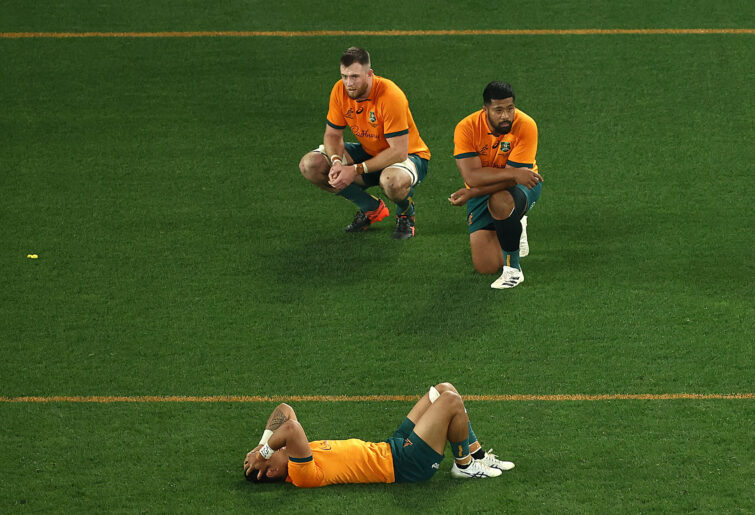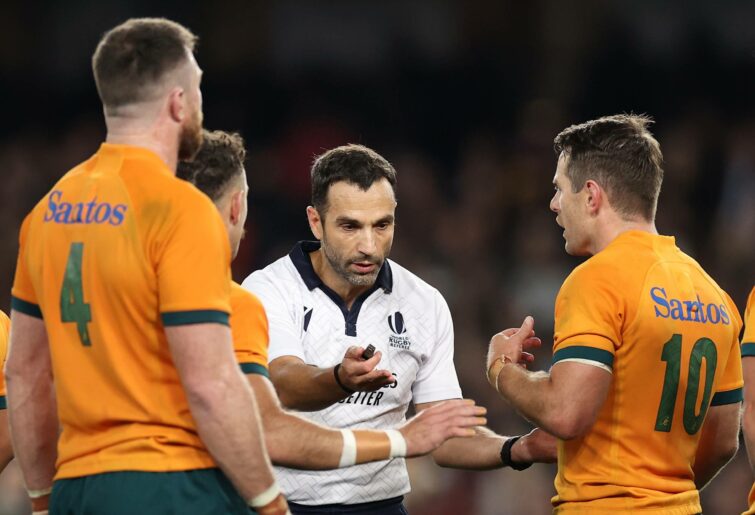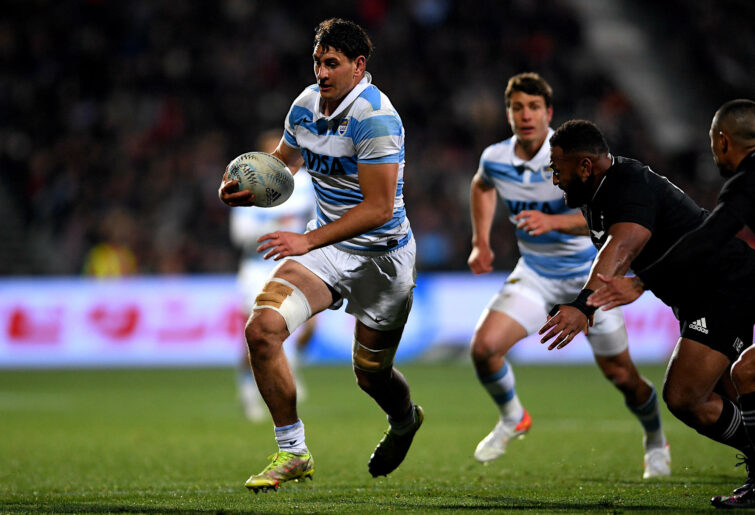A tournament that was positioned perfectly at the mid-point, with all four sides having won and lost twice, eventually split into two, with New Zealand and South Africa crushing the hopes of Australia and Argentina over the last 10 days.
Knowing they needed a winning margin of 39 points in the final match, South Africa also crushed their own hopes, employing a game plan that confirmed their set-piece strength, but was never the secret sauce required to set the Durban scoreboard alight.
Instead, New Zealand claimed their 19th Rugby Championship/Tri Nations title from 27 attempts, as well as retaining the Freedom Cup and Bledisloe Cup. Not a bad haul for a side said to be in total disarray just six weeks ago.
It was business as usual at the Eden Park fortress, the All Blacks far too strong for a Wallabies outfit that has been talking for weeks about the need to stay disciplined, but with the players seemingly unwilling or unable to match words with actions.

(Photo by Greg Bowker/Getty Images)
Jed Holloway set the tone early, and while the Wallabies didn’t concede during his sin bin, matches were burned. A hard-fought first quarter saw the All Blacks ahead by only three points, but it was no surprise when things opened up after that; 17-0 at halftime, 27-0 seven minutes later.
That period included a controversial try to Sam Whitelock. The call was tight, but the officials got it right; no matter Angus Bell placing his mitt on the ball, Whitelock’s secure underhand grip ensured he never lost possession, and meant the try was always his.
With the result never in doubt, all that was left was for the All Blacks to keep pushing the margin out. In that regard, conceding late to Jordan Petaia stung a lot more than it might otherwise have.
With Jason Ryan finding his feet in the coaching group, improvement in the All Blacks’ pack is becoming increasingly apparent. Unconvincing in Melbourne, their scrum this time assumed dominance, although it was the purposeful ball carrying that really caught the eye, with the All Blacks’ post-contact metres off the charts.
Among the most prominent was Tyrel Lomax, whose transformation from underachieving penalty magnet to dynamic All Black starter, is one of the rugby stories of the year.
Back on May 14, in a Round 13 Super Rugby match, with the Hurricanes scrum in the process of being destroyed by the Waratahs at Leichhardt Oval, Lomax suffered the ultimate humiliation, dragged before half-time, replaced by veteran Owen Franks.
Brett McKay, Harry Jones and Jim Tucker are joined by Tony Harper for an Instant Reaction podcast
Along with Ethan De Groot, who has made the necessary steps with respect to his conditioning, and hooker Samisoni Taukei’aho, the All Blacks now boast a front row that has an appealing balance of strength and youthful sass, which will only be better by the time they arrive in Paris in a year’s time.
At the other end of the scale, 142-Test veteran Whitelock also looks to be in a good place. Sam Cane is Ian Foster’s man as captain, but Whitelock increasingly looks assured as a leader, and to have enough spring in his legs to carry him through the World Cup.
Akira Ioane still feels like the odd man out in the pack, but with Scott Barrett and Shannon Frizell to come back at 6, the question mark over Ioane might prove to be moot.
Sweating on an opportunity at 12, Jordie Barrett more than justified his selection, putting in a dominant performance. He offers a foil for Richie Mounga inside him and looks like a good fit for Rieko Ioane outside him.
Full and frank assessment will have to wait until this midfield combination are properly tested on defence, but – accidental circumstances or not – this feels like a very promising development.
One of the reasons Barrett has been preferred at 15 is his ability under the high ball, but with South Africa now off the schedule for the best part of a year, and Caleb Clarke and Will Jordan capable catchers, Foster can feel more comfortable about the positional switch.
Before All Blacks fans get too carried away, caveats apply. This is not a vintage Wallabies team, and while a win is a win, context and perspective are everything.

Wallabies players react to losing to the All Blacks. (Photo by Robert Cianflone/Getty Images)
The All Blacks are due credit for the way they are digging themselves out of what looked to be a serious hole, and the triumph in Johannesburg spoke to a depth of character and self-belief that many thought the team and coach didn’t have in them.
Speculation about Foster’s job has been put to bed, giving the group much needed clear air, but it won’t be until December, at the completion of the northern hemisphere tour, that things can be better lined up.
The Wallabies’ situation seems more straightforward. This season they have beaten England, Argentina and South Africa, and were a whistle away from beating New Zealand. But they have also been beaten by all of those sides, in some cases, badly.
It’s that inability to build off success, to maintain skills execution, to find the sweet spot between intensity and red mist, and to lock in enduring combinations that ensure consistency of performance, that is failing the Wallabies.
This all starts at the collision. With the All Blacks able to punch through contact, the Wallabies found themselves scrambling. And when that happens, poor decisions get made and penalties get conceded.
On their own ball, aside from an early bust by Holloway, the Wallabies never found the same forward momentum. As a result, their attack lacked shape, and the Wallabies barely threatened when it counted.
As in Melbourne, Pete Samu stood out for his sheer combativeness. A late try to Petaia hinted at what might have been possible, but that was really just more of what has teased Wallabies fans throughout this 20-year Bledisloe Cup drought. Glimpses.
Given the focus on discipline – confirmed by Tate McDermott at half-time – the Wallabies failings were galling. As Allan Alaalatoa colourfully noted after the match, “It’s hard to verse the All Blacks with two yellow cards.”
Indeed. Particularly when, after losing Porecki, the Wallabies looked rudderless, desperately trying to avoid set pieces and resorting to hoisting an old-fashioned garryowen from a free kick.
Curiously, the Wallabies didn’t need to feel so constrained; either unwilling or unaware that they had the option to call for a scrum, which would have allowed for Folau Fainga’a’s introduction.
Post-match, a frustrated Dave Rennie called time on his side’s ill-discipline, saying that the solution might be found at the selection table. His loss of patience is understandable, and it is fast approaching time that players who are not delivering are set aside.
Paradoxically, changes at the selection table are one of the things holding the Wallabies back. Playing like a team which has been subjected to too many changes, lacking the cohesion and confidence that comes from continuity in selection, more changes are about to be forced upon them for the northern tour.
Lalakai Foketi joined the list of long-term injured, there is uncertainty around how the overseas-based player picks will be used, and there is still an opportunity for players involved in the ‘A’ tour to Japan to force their way to the top table.
As gloomy as things look today, all is not lost for the World Cup. The Wallabies still have time to gather their best personnel and link their better performances together. Remember also, how kind the World Cup draw gods have been.
But a few important things need to happen. As well as fixing their own failings, the Wallabies are due a kinder run with injury. And they need to nip in the bud any emerging hints that they are the perennial victim of injustice.
No matter their brush with Monsiuer Raynal in Melbourne, Australia is no better or worse treated than any side.

(Photo by Cameron Spencer/Getty Images)
One of the things that happens when the Bledisloe Cup becomes a distant 20-year memory, is that commentators and fans increasingly frame each piece of play in terms of how the officials have treated them.
Not only do these cries for fairness become increasingly insufferable to bear, they do the Wallabies no favours.
Could De Groot have been penalised for his tackle on Len Ikitau? Perhaps, but referee Andrew Brace had a clear view and judged that Ikitau was still making a play on the ball. TMO Ben Whitehouse also had the opportunity to review on the run, then chose not to step in.
Such incidents represent nothing more than a 50/50 call falling one way or the other. With the All Blacks already holding a match-winning lead, in terms of the match, in terms of where the Wallabies are and where they need to be, such rugby collisions are inconsequential.
When a 39-point winning margin is required, a lot of things need to go right, but South Africa’s stand-in flyhalf Frans Steyn clearly didn’t read the script, thrice missing touch from penalties, setting the tone for a frustrating afternoon for a lively Durban crowd.
More expected was Argentina’s contribution; a collage of ill-discipline, basic skill errors, and flashes of individual brilliance. Pace of play too was problematic; the Boks, without a minute to waste, repeatedly asking referee Damon Murphy to hurry the visitors along.
As Murphy was justified in pointing out, if the Springboks wanted to speed things up, they were welcome to forgo their own pre-lineout conferences, just as halfback Jaden Hendrikse could have secured faster possession from the ruck, instead of going through his customary, laborious set-up before kicking the ball away.
Perhaps the Boks had convinced themselves it was possible to win by 39, but even so, a static, stodgy game plan that relied upon an (admittedly strong) set-piece, was never going to deliver enough tries.
As it happened, four lineout maul tries, plus an after-the-siren consolation represented a below-par return against an opponent who had four players binned at various stages.
They were also unable to stop Argentina scoring – three times – with Willie le Roux left red-faced at the way he was stood up by Argentina’s player of the tournament, Juan Martin Gonzalez.

(Photo by Joe Allison/Getty Images)
South Africa knows that World Cups aren’t won by sides scoring 40-50 points against the clock. This Rugby Championship hasn’t fallen their way, but with the emergence of some fresh backline talent, they will feel that no lasting wounds have been inflicted.
Argentina meanwhile will feel satisfied with their two wins; a comprehensive towelling of Australia in San Juan and a historic first win in New Zealand, but their chronic discipline issues leave Australia in the shade.
Time and again cheap penalties are given away for ‘nothing’ offences like grabbing at a leg in a maul, or advancing ahead of the kicker; all of this despite the referee shouting multiple warnings.
They will benefit from a break; their leading men have shouldered a heavy load throughout, and with another 12 months for coach Michael Cheika to get fully accustomed to the players and vice-versa, assuming they learn to listen to the referee, they will be a dangerous opponent in France.
Refereeing remains a topic of intense debate, and Damon Murphy – not known for having a relaxed, empathetic manner at the best of times – only added fuel to the fire by finding 39 penalties, six yellow cards and two penalty tries.
Those numbers will do nothing to quell the concerns that referees have become too dominant, but it’s also worth highlighting the responsibility that the players have to the game.
Yes, there are pressing issues around the laws, TMO involvement and referees, under the microscopic eye of multiple cameras, caught between contradictory demands for accuracy and calls to keep the game flowing – often coming from the same people.
Nobody wants a World Cup where there are 39 penalties handed out per match. But a good place to start might be to point the finger in the right direction.
Last week, Bernard Foley learned a costly lesson about listening to the referee. Despite all of the publicity that surrounded that incident, it’s a lesson that the Springbok and Pumas players clearly didn’t pick up on.
































































































